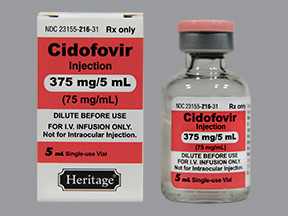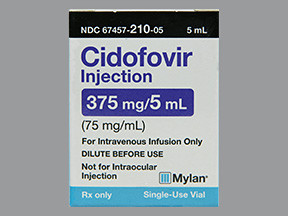CIDOFOVIR - INJECTION
PHONETIC PRONUNCIATION: (sye-DOH-foh-veer)
COMMON BRAND NAME(S): Vistide
GENERIC NAME(S): cidofovir
Uses
USES: This drug is used with probenecid to treat a certain viral eye infection (retinitis due to cytomegalovirus-CMV) in people with AIDS. It lowers your risk of blindness and other vision problems. Cidofovir belongs to a class of drugs known as antivirals. It works by stopping the growth of the virus. Cidofovir is not a cure for CMV retinitis, and your disease may still worsen during and after treatment.
How to use CIDOFOVIR - INJECTION
HOW TO USE: This medication is given into a vein as directed by your doctor, usually over 1 hour. It is usually given every 1 to 2 weeks or as directed by your doctor. This medication should not be injected into the eyes. Permanent loss of vision may occur. Dosage is based on your medical condition, body weight, and response to treatment. You will usually receive IV fluids before your dose of cidofovir. Your doctor will also direct you to take probenecid by mouth before and after you receive cidofovir. To prevent kidney problems, drink plenty of fluids unless otherwise directed by your doctor. This is especially important if you are vomiting or having diarrhea. If you are giving this medication to yourself at home, learn all preparation and usage instructions from your health care professional. Before using, check this product visually for particles or discoloration. If either is present, do not use the liquid. Learn how to store and discard medical supplies safely. It is very important to use the probenecid with this medication exactly as prescribed by your doctor. Nausea and vomiting due to probenecid may be prevented by taking it after meals. Your doctor may also prescribe another medication to prevent nausea, and may direct you to take antihistamines (e.g., diphenhydramine) and/or acetaminophen to prevent allergic reactions to probenecid. This medication works best when it is used regularly. Keep all your medical appointments. You may want to mark a calendar to help you remember. Do not use more or less of this drug than prescribed or stop using it (or your HIV medicines) even for a short time unless directed to do so by your doctor. Doing so may cause the amount of virus to increase, make the infection more difficult to treat (resistant), or worsen side effects. Avoid direct contact of this medicine with the skin/eyes/mouth. If contact occurs, wash thoroughly with soap and water. For eyes, rinse with a steady stream of tap water for at least 5 minutes.
Side Effects
Precautions
Interactions
Overdose
Images
Reviews
Faq for CIDOFOVIR - INJECTION
Cidofovir injection is primarily used to treat cytomegalovirus (CMV) retinitis in patients with AIDS.
Cidofovir works by inhibiting viral DNA synthesis, thereby preventing the spread and replication of the CMV virus.
Cidofovir is typically administered as an intravenous infusion by a healthcare professional.
Common side effects of Cidofovir injection may include kidney problems, nausea, vomiting, diarrhea, fever, and rash.
It is important to stay adequately hydrated during treatment with Cidofovir and to closely monitor kidney function. Also, contraceptives should be used during treatment, as Cidofovir can harm an unborn baby.
Cidofovir injection should only be used during pregnancy if clearly needed and under the direct supervision of a healthcare professional. It is not recommended for use in breastfeeding women.
It is important to inform your doctor about all the medications you are taking, including over-the-counter drugs and herbal supplements, as certain medications can interact with Cidofovir and cause potentially harmful effects.
The duration of treatment with Cidofovir injection can vary depending on the individual's response to therapy and the severity of the condition. It is usually continued until there is a significant improvement in CMV retinitis or as directed by the healthcare provider.
Long-term use of Cidofovir injection may lead to persistent renal impairment, so it is important to regularly monitor kidney function during and after treatment.
Warning
WARNING: This medication may cause serious (possibly fatal) kidney problems. To prevent kidney problems, your doctor will usually prescribe another medication (probenecid) and direct you to receive fluids into a vein. Avoid other medications that may also damage your kidneys (see also Drug Interactions section). Tell your doctor right away if you have any signs of kidney problems, such as change in the amount of urine, frothy urine, or bloody/pink urine. This medication can lower the body's ability to fight an infection. Tell your doctor promptly if you develop any signs of an infection such as fever, chills, or persistent sore throat. Laboratory and/or medical tests (e.g., kidney function tests, complete blood counts) should be performed before each dose to check for these side effects. Consult your doctor for more details. Keep all medical and laboratory appointments. Cidofovir has caused tumors in laboratory animals. Although there is no information in humans, cidofovir should be considered cancer-causing (carcinogenic). See also How to Use section.
Disclaimer
IMPORTANT: HOW TO USE THIS INFORMATION: This is a summary and does NOT have all possible information about this product. This information does not assure that this product is safe, effective, or appropriate for you. This information is not individual medical advice and does not substitute for the advice of your health care professional. Always ask your health care professional for complete information about this product and your specific health needs.


No Reviews Yet